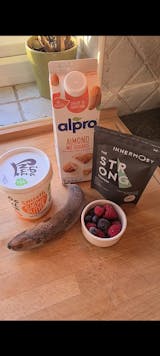A coconut is the edible fruit grown on a palm tree that are commonly found in Southeast Asia. Conveniently packaged in its own hard shell (that is actually used as charcoal in some countries), the coconut provides a low calorie and nutrient-rich snack, so what’s not to like?
Aside from a delicious option for one of your five-a-day, coconuts are used in a range of recipes, beauty products and more. Not to mention, they smell absolutely amazing.
Coconuts are undergoing a huge renaissance of late mainly due to the hydrating properties of coconut water. It’s quickly gone from being a staple of Bikram Yoga students who have sworn by the stuff for years, to an increasingly popular and mainstream post-workout rehydration drink that is touted as being a better alternative to water.
Is coconut water good for hydration?
Hawaiians call coconut water “noelani" which literally means “dew from the heavens”. This watery liquid inside unripe green coconuts is packed with vitamins and minerals. Coconut water powder condenses the vitamins and minerals into powder form by dehydrating the coconut water. It can be made back into richer, sweeter coconut water by mixing it with water or milk.
What is CocoMineral?
If we're talking about coconut water, it would be rude not to mention CocoMineral. CocoMineral is a powdered extract of coconut water, which contains the vitamins and minerals that coconut water has become so popular for. Namely, sodium and potassium.
So, what is CocoMineral? Well, CocoMineral is used by athletes to replenish any electrolytes that may have been lost in sweat during a workout, run, or any other kind of exercise. It's popular due to its low fat content and status as an extract high in carbohydrates, which makes it the perfect recovery ingredient.
Is coconut water good for hydration?
In short: yes. It's not a marketing scam, we promise. The natural electrolytes found in coconuts mean that coconut water is the perfect post-workout drink to replenish your energy levels naturally.
Whilst there is little evidence to suggest that coconut water is a better hydration source than good old fashioned natural spring water, it is a great alternative... and a lot of people prefer the taste. So, the choice is yours.
Whilst you can purchase coconut water in a nifty sustainable can or drinks carton, drinking out of a coconut is pretty cool, too. If we do say so ourselves. Anything to bring a bit of excitement to that post-workout routine, right?
The health benefits of coconut
Coconut water is full of health benefits. Not only is it low in calories and naturally cholesterol and fat free, but it also contains more potassium than four bananas and hydrates naturally, replenishing important electrolytes that are lost through exercise when you sweat.
If those health benefits aren't enough, check out these below:
- Great heart health benefits
- Helps control your blood sugar levels
- Powerful antioxidant properties
- Versatile, flexible, and easy to incorporate into your diet
- Rich in selenium
- Great iron levels
- Increases your fibre levels
Summary
As natural supplementations go, we'd say that incorporating coconut (in whatever form you may choose) is a great way to up your vitamin and mineral levels, stat. Coconut water powder is one of the ingredients in The Fit Protein. Recommended for those doing a lot of aerobic exercise, Bikram Yoga or sweating it out in a sauna... or all of the above.
References
- Ismail, I., R. Singh, and R. G. Sirisinghe. "Rehydration with sodium-enriched coconut water after exercise-induced dehydration." Southeast Asian journal of tropical medicine and public health 38.4 (2007): 769. Click here.
- Tai, Chih-Yin, et al. "An amino acid-electrolyte beverage may increase cellular rehydration relative to carbohydrate-electrolyte and flavored water beverages."Nutrition journal 13.1 (2014): 47. Click here.
























